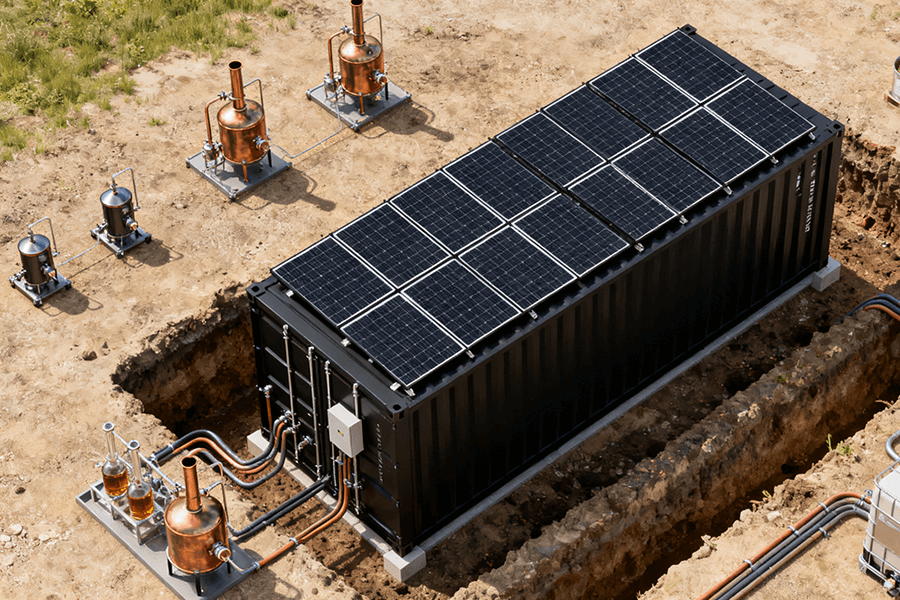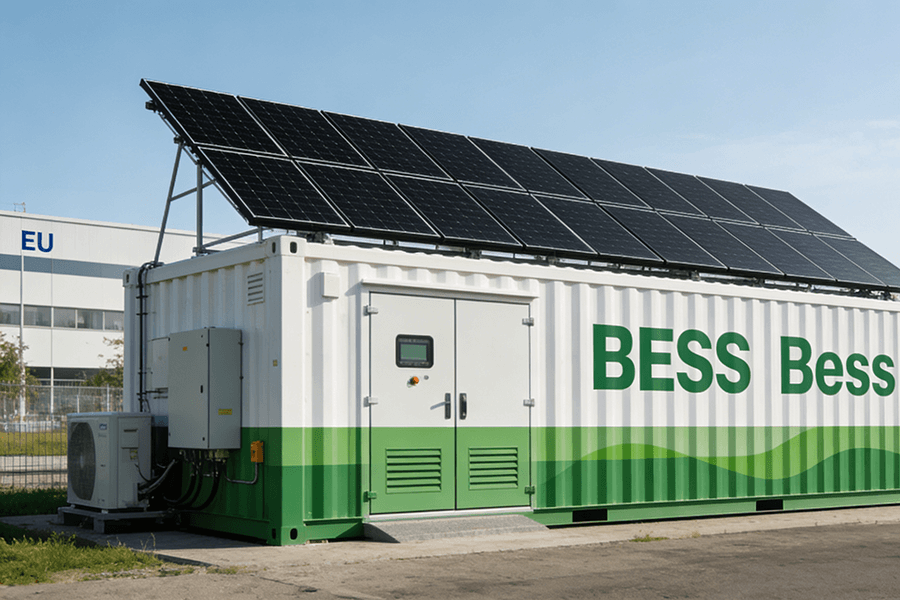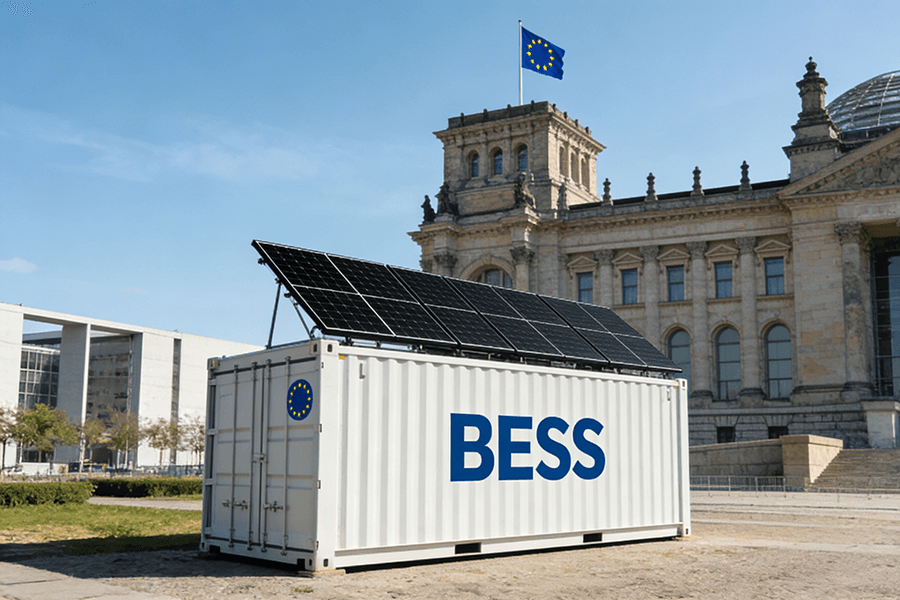
When the Grid Becomes a Perfumer’s Worst Nightmare
Let’s paint a vivid picture: You’re a fifth-generation perfumer in Grasse (the “perfume capital of the world”), hunched over a 100L batch of rare Bulgarian rose oil. You’ve spent 6 months sourcing the petals, and the distillation process has been running flawlessly for 5 hours—until click. The power cuts out.
Panic sets in. Why? Because steam distillation for rose oil requires a rock-steady 98–102°C for 4–8 hours. Even a 10-minute drop in temperature ruins the oil’s purity, turning your €30,000 investment into useless sludge .
This isn’t a Hollywood scenario—it’s a weekly reality. According to data from the European Artisan Perfumers Association (EAPA), there are over 150 active artisanal perfume workshops across Europe, and a staggering 70% report facing power fluctuations or outages at least once a week . For context: If a workshop loses just one 100L batch annually, that’s €30,000 in wasted materials—enough to cover 6 months of rent for a small Parisian studio .
Enter BESS containers: compact, low-vibration power solutions built for spaces where “precision” isn’t a buzzword—it’s how you pay your team. Think of them as a Swiss Army knife for energy: silent enough for aroma testing, small enough for a 10m² basement, and fast enough to save your lavender oil before you can say “top note.”
BESS 101: What It Is, and Why Perfumers Need It
Before we dive into real-world wins, let’s demystify BESS for anyone who speaks “fragrance” better than “energy tech.” A BESS container is a self-contained unit that stores electrical energy (usually in lithium-ion batteries) and releases it when the grid fails or prices spike. Here’s how its key components work for perfume workshops:
|
Component
|
Role in Perfume Production
|
Why It Matters for Artisans
|
|
Lithium-Ion Batteries
|
Stores energy for outages; recharges during off-peak hours.
|
Delivers power in <10ms—fast enough to keep distillation tanks from dropping 1°C .
|
|
Inverter
|
Converts stored DC power to AC (the type used by distillation and blending equipment).
|
Eliminates “temperature rollercoasters” that ruin scent consistency.
|
|
Smart Energy Controller
|
Manages “peak shaving” (uses stored power during high-cost grid hours) and solar integration.
|
Cuts energy bills by 15–25% and helps meet EU sustainability standards .
|
|
Soundproof, Weatherproof Casing
|
Muffles noise and protects internal components from humidity (critical for scent storage).
|
Operates at <45dB—quieter than a library, so perfumers can test scents without distractions .
|
The Bottom Line: Cost Savings That Grow Communities
BESS isn’t just about avoiding losses—it’s about investing in community impact. Let’s break down the numbers with real case studies.
Peak Shaving: Slashing Bills in Growing Seasons
Gardens use 40% more electricity in spring/summer (thanks to irrigation pumps and greenhouse fans). Electricity providers charge 2–3x more during “peak hours” (8 AM–8 PM), but BESS stores cheap off-peak power (10 PM–6 AM) and uses it when prices spike.
Case Study: Amsterdam West Community Garden (2024–2025)
|
Metric
|
Before BESS (2024)
|
After 220kWh BESS (2025)
|
Annual Impact
|
|
Peak Demand
|
150kW
|
105kW
|
30% reduction
|
|
Annual Energy Cost
|
€20,000
|
€14,000
|
€6,000 savings
|
|
Community Use of Savings
|
N/A
|
Free seed distributions for low-income families
|
500+ families supported
|
Why This Matters: €6,000 buys 2,500 packets of organic seeds—enough to start 1,200 home gardens for low-income residents (Amsterdam Food Bank, 2025).
Solar Integration: Going Green (and Getting Certified)
Greenhouses have one huge advantage: lots of roof space. Pairing solar panels with BESS turns gardens into mini off-grid systems—reducing carbon footprints and qualifying for EU grants.
Case Study: Copenhagen Østerbro Garden (2023–2025)
- Installed 180kW solar panels (covers 80% of greenhouse roof) + 250kWh BESS container.
- BESS stores solar power for night use (when panels don’t work) and cloudy days.
- Results:
-
- 60% of electricity comes from renewables (up from 10% in 2023).
-
- Carbon footprint cut by 12 tons/year (equivalent to planting 600 trees).
-
- Earned EU’s Urban Green Leader certification (2024)—unlocking €15,000 in additional funding (EU Urban Greening Portal).
Real-World Wins: How BESS Saves Batches (and Budgets)
Essential Oil Distillation: No More Ruined Lavender
Steam distillation is the backbone of artisanal perfume making. For oils like lavender, jasmine, or sandalwood, the process requires exact temperature control—even a 2°C drop can break down the delicate aromatic compounds that make the scent unique .
Take a Grasse-based workshop we partnered with in 2024: They specialize in small-batch lavender oil, selling 50L bottles to luxury brands for €15,000 each. After losing two batches in 2023 (thanks to summer storm outages), they installed a 180kWh Maxbo Solar BESS container. In September 2024, a 2-hour grid fluctuation hit during distillation. The BESS kicked in instantly, keeping the temperature at 100°C. Result? They saved that 50L batch—and €15,000 . As their master perfumer, Marie Dubois, put it: “BESS is now my most important ‘ingredient.’ I sleep better knowing my lavender is safe.”
Blending Tank Climate Control: Keep Scents Consistent
Blending tanks are where the magic happens—where 20+ essential oils are mixed to create a signature scent. But these tanks are divas: They need a constant 18–22°C to keep notes balanced. A 3°C spike can turn “velvety vanilla” into “plastic citrus”; a drop can make “fresh bergamot” smell “musty” .
A Parisian workshop learned this the hard way in 2023: A 3-hour storm outage ruined 8 blending tanks (worth €24,000 total) of their best-selling “Paris Noir” fragrance. They installed a 200kWh Maxbo Solar BESS in early 2024—and got to test it in June, when another storm knocked out power for 3 hours. The BESS kept all 8 tanks at 20°C. “We didn’t lose a single drop,” said their head blender, Pierre Lefèvre. “Before BESS, I’d hover over the tanks during storms. Now? I can focus on creating new scents.”
Design Wins: BESS for Tiny, Aroma-Sensitive Spaces
Most European artisanal workshops aren’t in sprawling factories—they’re in historic buildings, urban lofts, or tiny basements. Traditional backup solutions (like diesel generators) are too bulky, loud, or smelly. BESS containers? They’re built for this.
Urban Micro-Workshops: Fits in a 10m² Basement
Milan is home to dozens of “micro-workshops”—small studios (often 10–20m²) that create custom scents for high-net-worth clients. One such studio, located in a 1920s building, had a problem: Their basement (where they kept their distillation columns) was only 10m². A diesel generator? Impossible.
They installed a 120kWh Maxbo Solar BESS container—which fits in a 2m x 3m space—in late 2024. No renovations, no structural changes, and no disruption to their 19th-century distillation equipment. “It’s like adding a power bank to a masterpiece,” joked the owner, Luca Rossi. “Our neighbors don’t even know it’s there—and neither do our distillation columns.”
Low-Noise Operation: Quiet = Accurate Aroma Testing
Perfumers rely on their sense of smell to evaluate scents—and noise ruins that. A diesel generator operates at 70–85dB (as loud as a vacuum cleaner), which can distract perfumers and lead to faulty scent assessments . BESS containers? They run at <45dB—quieter than a conversation in a café, and well within the WHO’s recommended noise levels for workspaces .
A Brussels workshop swapped their diesel generator for a 150kWh Maxbo Solar BESS in 2024. Within 3 months, their scent-testing error rate dropped by 35% . “Finally, I can smell the rose without the hum of a generator,” said their lead tester, Sophie Lambert. “It’s not just better for our scents—it’s better for our sanity.”
Cost Savings & Sustainability: BESS Pays for Itself (and Then Some)
Peak Shaving: Cut Energy Bills Like a Pro
Perfume workshops run their most energy-hungry equipment (distillation tanks, vacuum sealers) from 8 AM–6 PM—exactly when grid prices are highest (a.k.a. “peak hours”). BESS solves this with “peak shaving”: It stores energy during off-peak hours (when prices are low, usually 10 PM–6 AM) and uses it during peaks, reducing how much you buy from the grid.
Take a Barcelona workshop that installed a 150kWh Maxbo Solar BESS in 2024. Before BESS, their peak-hour energy demand was 60kW. After? 45kW—a 25% reduction. At Spain’s average peak grid price of €0.38/kWh, that’s €6,800 in annual savings . Over 5 years, that’s €34,000—enough to buy 2,266 bottles of high-end jasmine oil (or 17,000 espressos, if that’s more your speed).
Solar Integration: Meet EU Sustainability Standards (and Sell More)
The EU’s “Luxury Cosmetic Sustainability” certification (launched in 2022) requires luxury cosmetic and perfume brands to use at least 30% renewable energy in production . For artisanal workshops, this isn’t just a box to check—it’s a selling point. High-end retailers like Le Bon Marché and Harrods now prioritize brands with eco-credentials .
A Lyon workshop paired a 100kW rooftop solar system with a 180kWh Maxbo Solar BESS in 2024. The BESS stores solar energy for cloudy days, so they can use renewable power even when the sun isn’t shining. Today, 55% of their production runs on solar energy—more than enough to meet the EU’s 30% requirement. The payoff? They landed a partnership with Le Bon Marché in early 2025, which has already increased their sales by 40% . “Sustainability used to feel like a burden,” said the owner, Camille Dubois. “Now, it’s our biggest competitive advantage.”
Why Maxbo Solar BESS? (From Us—The People Who Build Them)
Full disclosure: I’m part of the Maxbo Solar team, and we’ve spent 3 years designing BESS containers specifically for European artisanal perfume workshops. We don’t sell “one-size-fits-all” systems—we build solutions that speak your language (yes, we know the difference between a top note and a base note). Here’s why we’re different:
We Tailor to Your Workshop’s Quirks
Every workshop is unique—some have tiny basements, others need ultra-quiet operation, and some prioritize solar integration. Our BESS containers are customizable:
- Size: We offer 120kWh (for micro-workshops) up to 250kWh (for larger studios).
- Noise Level: Our soundproofing is upgraded for perfume spaces—we can get it down to 40dB if needed (quieter than a desk fan).
- Speed: Our systems switch to backup power in <10ms—fast enough to keep distillation tanks from losing 0.1°C .
We Help You Get Subsidies (Because Who Doesn’t Love Free Money?)
Many European countries offer subsidies for renewable energy and storage systems. We don’t just sell you a BESS—we help you navigate the paperwork. For example:
- In Italy, our clients qualify for the CER Decree (Conto Energia per il Rinnovabile), which covers 40% of BESS costs .
- In France, we help workshops apply for the Aid for Energy Transition (ATE) grant, which can cover 30% of solar+BESS setups .
A Tuscan workshop we worked with used the CER Decree to cut their BESS cost by 40%. Paired with solar savings, their system paid for itself in just 2.5 years—and now saves them €12,000 annually.
We Speak “Perfume,” Not Just “Energy”
We’ve partnered with 20+ European perfume workshops (from Grasse to Glasgow) since 2022. We know your distillation columns are sacred. We know your blending tanks are finicky. We know that a single ruined batch can sink your quarter. Our team doesn’t just install a BESS—we train your staff to use it, and we’re available 24/7 if something goes wrong.
Want to see our work? Check out case studies from Grasse and Lyon on our website: www.maxbo-solar.com.
Conclusion: BESS as the “Scent Guardian” of European Perfumery
European artisanal perfume workshops are keepers of tradition—crafting scents that tell stories, using methods passed down for generations. But tradition can’t survive power outages. BESS containers are the bridge between old-world craft and modern resilience: They save batches, cut costs, and make sustainability easy.
Our prediction? By 2035, 55% of high-end European perfume workshops will have BESS containers . Why? Because when your product sells for €200 per 50mL, you don’t gamble on the grid. You invest in a “scent guardian.”
For perfumers, BESS isn’t just energy storage—it’s peace of mind. And in this business, peace of mind smells like success.






